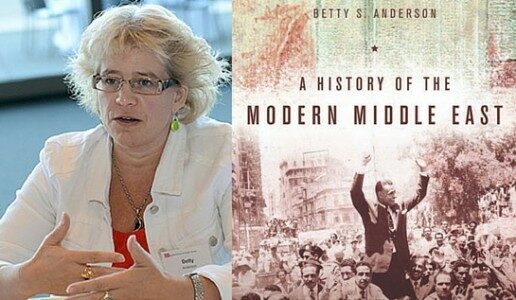Anderson Interviewed on History of the Modern Middle East
Betty Anderson, Director of the Institute for the Study of Muslim Societies and Civilizations, at the Frederick S. Pardee School of Global Studies at Boston University, was recently interviewed about her book A History of the Modern Middle East: Rulers, Rebels, and Rogues (Stanford University Press, 2016).
Anderson was interviewed for an October 2016 article on Jadaliyya entitled New Texts Out Now: Betty S. Anderson, A History of the Modern Middle East: Rulers, Rebels, and Rogues.
From the text of the article:
Jadaliyya (J): What made you write this book?
Betty Anderson (BA): For years, I used William Cleveland’s A History of the Modern Middle East in my classes and supplemented it with readings from my colleagues’ monographs on social and intellectual history and with lectures from my own research. I had to do that because Cleveland presented a clear political narrative but left out the influence, for example, of students, workers, peasants and women on Middle Eastern history and spent little time discussing the ideas and identities debated by governors and governed alike. I melded these issues together in my classes every semester but still found students struggling to make the connections in their own papers, foregrounding political activities while treating as secondary the material on other social actors.
I also wanted to counteract media portrayals of the Middle East that allow country names (“Egypt,” “Saudi Arabia”), stereotypes (“terrorist,” “militant,” “Shi‘a,” “youth”), or politicians (“Erdoğan”, “ayatollahs”) to represent the actions and belief systems of millions of people. The region can appear as an area of unchanging opinions and prejudices or as a place of implacable hostility when these categories hold sway across the media. It is impossible to understand developments in the region over time or to analyze the tumultuous events of the last few years through narrow lenses, but too often that happens because of the media coverage. These categorizations fail to explain the complex relationships that have been forged and the overlapping identities, grievances, and desires that the peoples of the Middle East have held and continue to express.
You can read the entire interview here.
Dr. Anderson has received Fulbright and American Center for Oriental Research (ACOR) grants to conduct research in Jordan and Lebanon. At Boston University, she is Director of the Institute for the Study of Muslim Societies and Civilizations, as well as the Institute’s advisor to the two Muslim Studies Minors. You can read more about her here.
